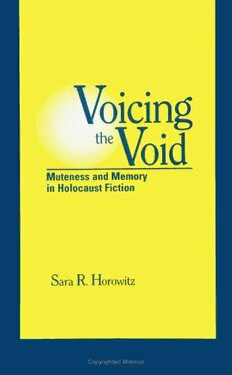
Voicing the Void: Muteness and Memory in Holocaust Fiction PDF
300 Pages·1997·1.097 MB·English
Most books are stored in the elastic cloud where traffic is expensive. For this reason, we have a limit on daily download.
Preview Voicing the Void: Muteness and Memory in Holocaust Fiction
Description:
Through new close readings of Holocaust fiction, this book takes the field of Holocaust Studies in an important new direction. Reading a wide range of narratives representing different nationalities, styles, genders, and approaches, Horowitz demonstrates that muteness not only expresses the difficulty in saying anything meaningful about the Holocaust-it also represents something essential about the nature of the event itself. The radical negativity of the Holocaust ruptures the fabric of history and memory, emptying both narrative and life of meaning. At the heart of Holocaust fiction lies a tension between the silence that speaks the rupture, and the narrative forms that attempt to represent, to bridge it. This book argues that the central issues in Holocaust historiography and literary criticism are not simply prompted by the fictionality of imaginative literature-they are already embedded as self-critique in the fictional narratives. While the current critical discourse argues either for or against the unrepresentability of these events (and thus the appropriateness of imaginative literature) this book develops the theme of muteness as the central way in which literary texts explore and provisionally resolve these central issues. Focusing on the problem of muteness helps unfold the ambivalences and ambiguities that shape the way we read Holocaust fiction, and the way we think about the Holocaust itself.
See more
The list of books you might like
Most books are stored in the elastic cloud where traffic is expensive. For this reason, we have a limit on daily download.
